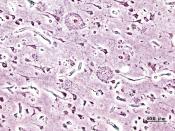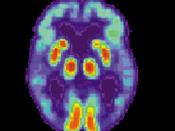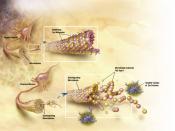Alzheimer's disease is a progressive degenerative disease of the brain that causes increasing loss of memory and other mental abilities. The disease attacks few people before age sixty, but it occurs in about twenty percent of people who live to age eighty-five. The disease is named after the German psychiatrist and neuropathologist Alois Alzheimer, who first described its effects on brain cells in 1907.
Symptoms of Alzheimer's disease come in three stages: early, late, and advanced. Early stages include forgetfulness of recent events, increasing difficulty in performing intellectual tasks such as accustomed work, balancing a checkbook or maintaining a household. Also, personality changes, including poor impulse control and poor judgement.
Later stages include difficulty doing simple tasks, such as choosing clothing and problem solving. Also, failure to recognize familiar persons, disinterest in personal hygiene or appearance, difficulty feeding oneself, belligerence and denial that anything is wrong, loss of sexual inhibitions, wandering away, anxiety and insomnia.
Advanced stages include complete loss of memory, speech and muscle function. This includes loss of bladder and bowel control. The patients in the advanced stages need total care and supervision. They also exhibit extreme belligerence and hostility. Eventually, patients become bedridden and weak. In their weakened condition, they are vulnerable to pneumonia and other infectious diseases. Most patients die from such diseases eight to ten years after developing Alzheimer's disease.
The cause of Alzheimer's disease is not certain. The disease results from the gradual destruction of brain cells, but the cause of this destruction is not fully understood. There is no known cure. Brain tissues from affected persons shows a slight excess of aluminum,


